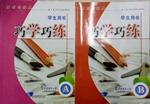题目内容
, the young man succeeded in accomplishing the task.
A. To his great credit B. Great to his credit
C. To his much credit D. To his greatly credit
 巧学巧练系列答案
巧学巧练系列答案St. Paul's Cathedral Ludgate Hill, EC4 Underground: St. Paul's; Bus: 6, 8, 11, 15, 22, 25 Open: Daily 8:00-19:00 (17:00 from Oct. to Mar.) Entrance free Designed by the great architect, Sir Christopher Wren, St. Paul's Cathedral was built following the Great Fire of London of 1666, which destroyed the gothic cathedral on the site at that time. It is an inescapable attraction for all travellers to this great city and the most recognisable gothic cathedral in England. Its choir(唱诗班) is internationally famous. Prince Charles and Lady Diana Spencer were married here in 1981. | |
Buckingham Palace South end of the Mall (SW1) Underground: St. James's Park, Victoria, Hyde Park Corner, Green Park; Bus: 2, 11, 14, 16, 19, 22, 24, 29, 30, 38, 52, 73, 74, 137 Buckingham Palace is Queen Elisabeth II's official residence(住所), and has been the official residence of Britain's monarch(君主) since 1837. The State Rooms at Buckingham Palace have been opening to the public for the Annual Summer Opening, in August and September, since 1993. The Queen is not at Buckingham Palace when it is open to the public; she goes to one of her country residences. The State Rooms are extremely grand. You can see many of the treasures of the Royal Collection: paintings by Rembrandt, Rubens and Canaletto; and beautiful examples of English and French furniture. | |
The Tower of London Tower Hill, EC3 Underground: Tower Hill; Bus: 42, 78 Open: Mon.-Sat. 9:00-18:00; Sun. 8:00-19:00 Parts of the Tower of London are over nine centuries old, as building began under William the Conqueror in 1078. Famous as a prison in the distant past, the Tower has also been a royal residence, a zoo and an observatory(瞭望台). It is now a museum and many thousands of people visit it every year in particular to see the Crown Jewels. Only by going inside can you experience nearly a thousand years of history and hear the myths and legends that make it “a day out to die for”. | |
Westminster Abbey Broad Sanctuary, SW1 Underground: Westminster, St James's Park; Bus: 3, 11, 12, 24, 29, 39, 53, 59, 76, 77, 88, 109, 155, 168, 170, 172, 184, 503 Open: Daily 8:00-18:00 (Mar.-Dec., Tuesday till 20:00) Entrance free Located next to the Houses of Parliament in the heart of London, Westminster Abbey is a gothic church and place of worship. The building of the present Abbey was started by King Henry III in 1245. The oldest parts of the building date back to 1050. Westminster Abbey has hosted many royal weddings including the wedding of The Queen and Prince Philip in 1947 and the wedding of Prince William and Kate in 2011. It is a traditional place of coronation(加冕礼) and burial for English monarchs—38 monarchs have been crowned at the Abbey. There are many tombs there, including those of Queen Elizabeth I, “Bloody” Queen Mary, naturalist Charles Darwin, many poets and writers. |
1.You can see the inside of all the buildings all the year around except .
A. St. Paul's Cathedral B. the Tower of London
C. Westminster Abbey D. Buckingham Palace
2.The two places you can visit by getting off at the same underground station are .
A. Buckingham Palace and Westminster Abbey
B. Buckingham Palace and St. Paul's Cathedral
C. Westminster Abbey and the Tower of London
D. the Tower of London and St. Paul's Cathedral
3.Where is the text most probably taken from?
A. A history book about London.
B. A guidebook for visitors to London.
C. A book about London's development.
D. A book about London's churches.

